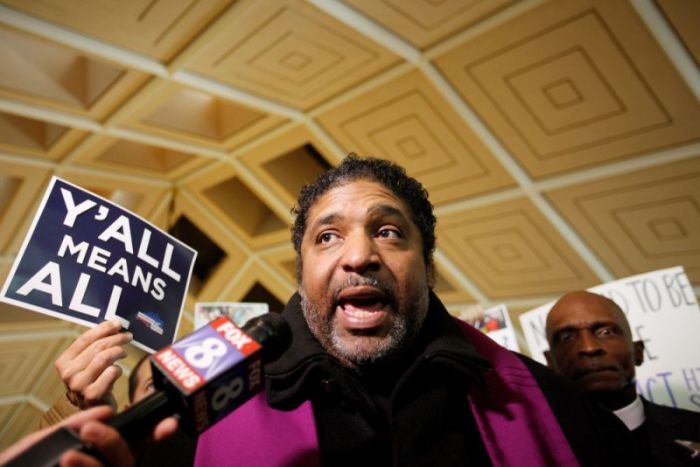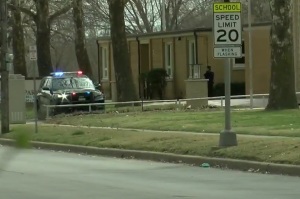Black pastors call on Trump admin. to address impact of coronavirus on minority communities

A group and black pastors and researchers called on the Trump administration Wednesday to address the disproportionate impact of the new coronavirus on minority communities.
“We have gathered as pastors, as faith leaders around this country to simply state that last week’s headlines reminded all of us that racism is a public health issue. It has long been a matter of life and death. Sadly and immorally, we live in a country where skin color is hazardous to one’s health and mortality is not determined by ones genetic code but instead by one’s Zip Code,” the Rev. Frederick Douglass Haynes III, senior pastor of the 12,000-member Friendship-West Baptist Church in Dallas, Texas, said during a press conference sponsored by Repairers of the Breach based in Goldsboro, North Carolina, and the Samuel DeWitt Proctor Conference based in Chicago.
The headlines Haynes alluded to include ones such as recent report in The New York Times with preliminary data released by New York City which shows how the coronavirus is killing black and Latino people at twice the rate that it is killing white people. Nationwide data also reflect a similar trend.
“As pastors who serve in communities that are most impacted by the coronavirus crisis we have come together to issue a moral appeal to the conscience of the nation in a state of emergency in the tradition of the biblical prophets who address nations in crises and prophets in this nation such as … Martin Luther King Jr and many others who fought to redeem the soul of America,” Haynes said. “We appeal to those in power on behalf of communities in pain and in grief. We appeal to you to channel treatment and resources to those areas in our body politic that have suffered the most from this national infection that has allowed this virus to spread disproportionately.”
Other pastors who joined the conference were Repairers of the Breach President William J. Barber II, who also leads Greenleaf Christian Church; the Rev. Traci Blackmon, executive minister of justice and witness ministries of The United Church of Christ and senior pastor of Christ The King United Church of Christ in Florissant, Missouri; and the Rev. Dr. Leslie Callahan, the first female pastor of the 119-year-old St. Paul’s Baptist Church in Philadelphia.
“As of this moment black and brown people are being tested least but dying the most. We appeal to the federal and state leadership to prioritize healing humanity over restarting the economy. We appeal to this country to ensure that we create a vision of wellness and wholeness for our communities to repair centuries of the intentional infection of racism,” Haynes added in his address during the conference. “I conclude by remixing that drum major for justice, Martin Luther King Jr. In reminding us what the coronavirus crisis has shown us. Infection anywhere is a threat to health and wellness everywhere.”
In his discussion of the issue, Barber highlighted a letter which he said was addressed to President Donald Trump, Vice President Mike Pence, House Speaker Nancy Pelosi, Senate Majority Leader Mitch McConnell, Surgeon General Jerome Adams as well as the White House Coronavirus Task Force headed by Pence.
"So therefore we come today and say dear President Trump, Vice President Pence, Speaker Pelosi, Majority leader McConnell, Surgeon General Adams and members of the White House Coronavirus Task Force," Barber said.
In the letter, pastors called on the Trump administration to immediately utilize the power of the Defense Production Act of 1950 to mobilize manufacturers to produce personal protective and lifesaving equipment such as face masks; work with local government officials to set up testing sites in minority communities hard hit by the coronavirus; urge 14 states yet to expand Medicaid to do so now; urge Congress to pass a fourth coronavirus rescue bill that focuses on the poor; and coordinate an effort to release demographic data on coronavirus victims.
“We know from numerous studies including the Institute of Medicine that African Americans have less access to healthcare and often receive lower quality care than their white counterparts many times at the same hospital even before this coronavirus. We know that pandemics spread through the fissures of our society that are caused by the inequality. So the disease is not just biological but sociological. We need to address these inequalities now and not wait till some time in the future if we’re gonna deal with this pandemic,” Barber said.
“Southern states, with some of the highest black populations have refused to expand Medicaid that would have provided healthcare and they have done it with the permission and encouragement of the current Trump administration,” he argued.
He also called out the surgeon general for telling minority communities not to smoke and drink during the outbreak since both weaken the body's immune system.
“This is why two weeks ago when our Surgeon General Jerome Adams with the approval of Trump and Pence, gave a national briefing and he said in his comments that he had a special message for African Americans and Latino communities. He was calling them to step up and help stop the spread of the virus by avoiding alcohol, tobacco and drugs,” Barber said.
“He was so wrong to do that. While he went on to talk about possible social ills he never clarified that in his comments with the approval of Trump and Pence, he committed two glaring sins which too often occur in America’s commentary on black health and black death and are especially egregious when they are committed by black people in power,” Barber continued.
“The first is targeting black and brown communities to change their behavior in order not to die and then do not address how decades of structural racism, political exploitation and economic exclusion have compounded health and wealth disparities in black communities,” he said.
“The tendency has often been to trivialize those inequities as simply their fault,” he added. “We cannot be silent. We will mobilize our congregants. We will demand a moral response for no virus or physical distancing can separate us from our call to challenge nations to care for the least of these among us.”
Chandra Ford, associate professor in the Department of Community Health Sciences at UCLA who also leads the Center for the Study of Racism, Social Justice & Health and weighed in on the call, said that a failure to address the inequalities in society that affect the impact of the virus on minority communities will also affect the nation as a whole.
“The disparities that are emerging reveals that the inequalities that already exist in our society and that we have chosen to leave unaddressed are exacerbating the spread of COVID-19 in black, indigenous and other people of color communities and the socioeconomically marginalized communities,” she said.
“As long as these underlying social inequalities affect pockets of our society, the COVID-19 pandemic will continue to be extended. It will remain an issue and it will make its eradication more difficult. And that’s a problem not just for those in the marginalized communities but for all of us,” she added.





























